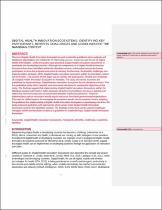 ResearchSpace
ResearchSpace
Digital health innovation ecosystems: Identifying key participants, benefits, challenges and guidelines for the Namibian context
JavaScript is disabled for your browser. Some features of this site may not work without it.
- ResearchSpace
- →
- Research Publications/Outputs
- →
- Journal Articles
- →
- View Item
| dc.contributor.author |
Iyawa, GE

|
|
| dc.contributor.author |
Herselman, Martha E

|
|
| dc.contributor.author |
Botha, Adèle

|
|
| dc.date.accessioned | 2019-03-25T14:07:35Z | |
| dc.date.available | 2019-03-25T14:07:35Z | |
| dc.date.issued | 2019-02 | |
| dc.identifier.citation | Iyawa, G.E., Herselman, M.E. and Botha, A. 2019. Digital health innovation ecosystems: Identifying key participants, benefits, challenges and guidelines for the Namibian context. International Journal of Reliable and Quality E-Healthcare, vol. 8(2): 14pp | en_US |
| dc.identifier.issn | 2160-9551 | |
| dc.identifier.issn | 2160-956X | |
| dc.identifier.uri | https://www.igi-global.com/article/digital-health-innovation-ecosystems/223196 | |
| dc.identifier.uri | http://hdl.handle.net/10204/10850 | |
| dc.description | Copyright: 2019 IGI. Due to copyright restrictions, the attached PDF file contains the pre-print version of the published item. For access to the published version, please consult the publisher's website. | en_US |
| dc.description.abstract | The purpose of this paper was to identify key participants who will participate in transactions carried out in the ecosystem for the Namibian context. This is to identify and describe specific professionals as well as their role in the ecosystem, hence, contributing to the empirical research on participants of a Digital Health Innovation Ecosystem. Another significant contribution of this paper is the identification of the benefits, challenges and presentation of guidelines for implementing a Digital Health Innovation Ecosystem for the Namibian context which would enable the actual implementation of the ecosystem. This paper also supports the strengthening of the MDGs 4,5 and 6 specifically through the Digital Health Innovation Ecosystem. The remainder of this paper is structured as follows; section 2 presents the literature review of Digital Health Innovation Ecosystems. Section 3 describes the research methodology. Section 4 presents the results of the study. Discussions, as well as the guidelines with approaches for implementing a Digital Health Innovation Ecosystem for the Namibian context,, are presented in Section 5. Conclusions are made in Section 6. | en_US |
| dc.language.iso | en | en_US |
| dc.publisher | IGI Global | en_US |
| dc.relation.ispartofseries | Worklist;22031 | |
| dc.subject | Digital health innovation ecosystem | en_US |
| dc.subject | Namibia | en_US |
| dc.title | Digital health innovation ecosystems: Identifying key participants, benefits, challenges and guidelines for the Namibian context | en_US |
| dc.type | Article | en_US |
| dc.identifier.apacitation | Iyawa, G., Herselman, M. E., & Botha, A. (2019). Digital health innovation ecosystems: Identifying key participants, benefits, challenges and guidelines for the Namibian context. http://hdl.handle.net/10204/10850 | en_ZA |
| dc.identifier.chicagocitation | Iyawa, GE, Martha E Herselman, and Adèle Botha "Digital health innovation ecosystems: Identifying key participants, benefits, challenges and guidelines for the Namibian context." (2019) http://hdl.handle.net/10204/10850 | en_ZA |
| dc.identifier.vancouvercitation | Iyawa G, Herselman ME, Botha A. Digital health innovation ecosystems: Identifying key participants, benefits, challenges and guidelines for the Namibian context. 2019; http://hdl.handle.net/10204/10850. | en_ZA |
| dc.identifier.ris | TY - Article AU - Iyawa, GE AU - Herselman, Martha E AU - Botha, Adèle AB - The purpose of this paper was to identify key participants who will participate in transactions carried out in the ecosystem for the Namibian context. This is to identify and describe specific professionals as well as their role in the ecosystem, hence, contributing to the empirical research on participants of a Digital Health Innovation Ecosystem. Another significant contribution of this paper is the identification of the benefits, challenges and presentation of guidelines for implementing a Digital Health Innovation Ecosystem for the Namibian context which would enable the actual implementation of the ecosystem. This paper also supports the strengthening of the MDGs 4,5 and 6 specifically through the Digital Health Innovation Ecosystem. The remainder of this paper is structured as follows; section 2 presents the literature review of Digital Health Innovation Ecosystems. Section 3 describes the research methodology. Section 4 presents the results of the study. Discussions, as well as the guidelines with approaches for implementing a Digital Health Innovation Ecosystem for the Namibian context,, are presented in Section 5. Conclusions are made in Section 6. DA - 2019-02 DB - ResearchSpace DP - CSIR KW - Digital health innovation ecosystem KW - Namibia LK - https://researchspace.csir.co.za PY - 2019 SM - 2160-9551 SM - 2160-956X T1 - Digital health innovation ecosystems: Identifying key participants, benefits, challenges and guidelines for the Namibian context TI - Digital health innovation ecosystems: Identifying key participants, benefits, challenges and guidelines for the Namibian context UR - http://hdl.handle.net/10204/10850 ER - | en_ZA |





